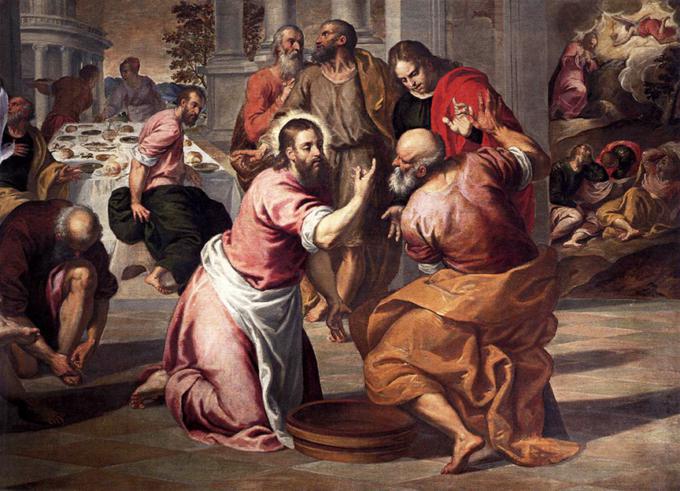
Spirituality
Gentle Jesus, meek and mild. Jesus, easygoing and completely approachable by all at all times? Or, if we presume so, do we get him wrong even in his humanity?

Pakaluk
I wonder that Our Lord says on Holy Thursday, "No longer do I call you servants, ... I have called you friends" (Jn 15:15). He had spent three years with them. They went through many things together. They saw him heal, expel demons, and teach. He explained things privately to them. And yet only now does he call them "friends." And he does so deliberately as if conferring the name to them. He does not say, "Isn't it great that we've become friends?" or "Don't you see that now we are so close as to be friends?" Rather, they are now "called friends."
An early Christian heresy was called "Docetism," from Greek for "apparition." Some early followers of Jesus were so impressed by his divine works that they concluded he must have been a divinity, who simply appeared to be human, as if wearing a disguise, like "Jupiter's wanderings on earth" in the pagan myths. Jupiter did not assume humanity (absurd for the Greeks) but disguised himself as human.
Docetism deserves more credit than we give it. Like all heresies, it contains truth. How can someone who restores sight by mere touch, or instantaneously makes leprous flesh healthy, or expels demons by his command, or passes through walls, be human? Jesus, well aware of the difficulty in believing it, ate a fish to prove it (Luke 24:42).
I say all this to counterbalance what surely is our contrary tendency, to take Our Lord's humanity for granted, and -- because we can have friendship with him only on that plane of equality -- his friendship, also.
Put it this way: Was Jesus, considered even "qua" human, someone you might have been palsy-walsy with? Gentle Jesus, meek and mild. Jesus, easygoing and completely approachable by all at all times? Or, if we presume so, do we get him wrong even in his humanity? Do we, like Herod, take him for granted? (Lk 23:6-12)
There are many mere human beings who, not because of any fault but -- just the opposite! -- because of some great strength of character, are difficult to be "friends" with. Friendship is possible in such cases but as an attainment that maybe even needs an invitation.
Very intelligent persons are like this. How many smart women have said that they found it hard to "date" anyone as girls because boys were overwhelmed in their presence? Most of us could not just carry on jokingly with Einstein.
Also, persons with the character of "greatness" -- maybe I'm wrong, but I'm doubtful anyone was palsy-walsy with Beethoven, Napoleon, MacArthur, or Carnegie. Extreme spiritual devotion is like this, too. When St. Philip Neri disappeared for days to pray alone in the catacombs of Rome, not many followed him. He became the amiable "Apostle of Rome," but one found him congenial and witty, I suspect, only after first approaching him with some trepidation and awe.
Now consider how unusual Our Lord was, in his humanity, not by obvious miracles. He was the sort of person who, apparently as human, could fast for six weeks and then feel hungry only because he allowed himself (Matt 4:2). When an angry crowd wanted to throw him off a cliff, apparently by the mere force of his presence, he could pass through them and walk away (Luke 4:30). By speaking, he could cause a mob of strong men armed with swords and clubs to fall back on the ground like helpless toddlers (Jn 18:6).
He seemed to feel emotions like indignation and anger deliberately, not by automatic reaction (Mk 1:41, Jn 11:33). Of course, he knew the thoughts of others directly, not by inference (Jn 2:25). He seems to have died deliberately, too, deciding when he would give up his spirit (Mk 15:37).
His saying something like "do not touch me for I have not yet ascended to my Father" (Jn 20:17) -- which still today no one quite understands -- was entirely "in character." John noted it from the Magdalene and passed it down. There must be something important in it, but who can say for sure what it is?
This is to say nothing of his debates with learned rabbis before he was a teenager -- "when he was 12 years old," Mary told Luke. Imagine that you take your 12-year-old who has never had musical instruction to an orchestra concert. He disappears, and you find him later backstage looking over the score with the conductor, discussing harmonic modulations.
And you expect to be palsy-walsy with him? You take him for granted and assume he is going to be your pal? He's not like you. He is God, and even as a human, he is ferociously intelligent, great-souled, passionately devout, mystical and unusual. His thoughts are not your thoughts. This is to say nothing of the disparity between Spotless Lamb and sinner.
I don't doubt that Jesus will be anyone's most intimate companion. I don't deny that "in the abandoned tabernacle" he forebears all kinds of slights and indignities. But suppose we take justification as proxy for friendship. His words:
"But the tax collector, standing far off, would not even lift up his eyes to heaven, but beat his breast, saying, 'God, be merciful to me a sinner!' I tell you, this man went down to his house justified rather than the other" (Lk 18:13-14).
- Michael Pakaluk, an Aristotle scholar and Ordinarius of the Pontifical Academy of St. Thomas Aquinas, is a professor in the Busch School of Business at the Catholic University of America. He lives in Hyattsville, MD, with his wife Catherine, also a professor at the Busch School, and their eight children. His latest book is "Mary's Voice in the Gospel of John" available from Amazon.
Recent articles in the Spirituality section
-
He saw the cloths and believedBishop Robert Barron
-
God's instrument for viewing the crucifixionMichael Pakaluk
-
QuinquagesimaMichael Pakaluk
-
Pro-life Christians: Now is the time to shout from the rooftopsBishop Robert Barron
-
Seeking an indulgence as an act of faithMichael Pakaluk


















